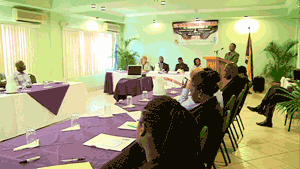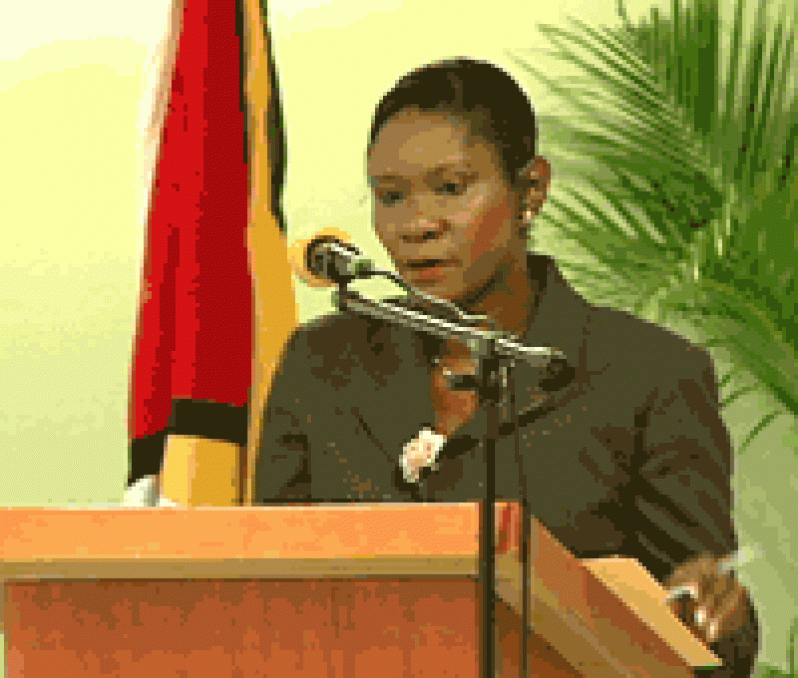THE Ministry of Human Services and Social Security in collaboration with the United Nations Development Programme (UNDP) yesterday hosted a workshop aimed at raising greater awareness on the issue of Trafficking in Persons (TIP), providing an opportunity for the relevant stakeholders to take stock of the achievements that have been made, lessons learnt and improve responses.
 Over the years, government through a specially established Ministerial Task Force has made significant progress in addressing the issue nationally with interventions such as: legislation, strict penalties, and better support systems for victims. However, much more need to be done.
Over the years, government through a specially established Ministerial Task Force has made significant progress in addressing the issue nationally with interventions such as: legislation, strict penalties, and better support systems for victims. However, much more need to be done.
Minister of Human Services and Social Security, Jennifer Webster, addressing the participants, said that at the level of the Task Force, the Administration recognises fully the need for a robust response involving government agencies and Non-Governmental Organisations (NGOs).
This kind of response forms a key component of the country’s National Plan 2012-2013 built on the principles of the four Ps: Prevention, Protection, Prosecution and Partnership.
“Our primary objective is to implement the deliverables set out in that action plan, which includes the review and further improvement of the protocol for victim identification and direct victim assistance and the training at the level of first responders,” Minister Webster said.
The Task Force also recognises the important role that the local media can play in sensitising the Guyanese populace against the threat to human security such as TIP, and fully intends to engage the media in a constructive manner to fight this scourge.
Government has sought to implement imaginative approaches within the context of available resources so as to prevent and mitigate the impacts of current and emerging threats. To this end, there has been enhanced cross-border and anti-crime efforts including TIP activities among Guyana, Suriname and Brazil and at the Regional level, with sister-CARICOM countries, under the Treaty on Mutual Assistance on Criminal Matters.
“The Ministerial Task Force recognises the need to embark on a different course of action. TIP is indeed a threat to the most important value in our society, freedom and human dignity. Our counter action must therefore, be as strong as the threat. It is with this in mind that today’s workshop is designed to ensure that we put the best team out there in the various communities… we need to ensure that the response is multi-dimensional,” the Minister said.
The Task Force has developed a guide for the inter-agency response to TIP which is useful in victim identification, and is aimed at strengthening the capability of inter-agency teams so that they can respond more effectively to victims.
Minister Webster also pointed to the need to aggressively monitor the re-integration of victims and their families, and provide the necessary support and assistance to facilitate this reintegration into society.
She assured that at the level of government, there will be continued efforts through various mechanisms such as training and public awareness campaigns.
She added that, “we need to address the historical gender-gap that lends to women becoming victims of TIP; it is therefore our primary focus to further enhance the capacity that exists in hinterland communities towards the prevention and fight against TIP.”
Minister Webster called on the private sector, faith-based organisations, and educational institutions to collaborate in a greater manner to tackle this issue.
Meanwhile, UNDP Resident Representative, Khadija Musa said her organisation is very pleased to be able to support the Government of Guyana in the implementation of this project. (The workshop itself is only one aspect of a wider project to be undertaken to strengthen Guyana’s capacity to respond to human trafficking).
She said the issue of trafficking has increasing significance in Guyana especially with the growing numbers of young women who are arriving from places like Brazil and with the migration of women from the coastland to the interior. She cited the report prepared by the UN Refugee Agency-June 11, 2011, which speaks to the issue.
“The project aims to strengthen the efforts of the Ministry towards public awareness, particularly to high risk community, training of focal points, victim support, and updating directory of focal points,” Musa outlined.
Political and Economic Head of the US Embassy, Michael Fraser said the issue of human trafficking distorts markets and impacts legitimate businesses, and fuels violence and organised crime.
TIP is an estimated US$32B per year global industry; after drug-trafficking, it is world’s second most profitable criminal enterprise, a status it shares with trafficking in illegal arms.
Fraser added that criminal organisations increasingly turn to human trafficking because of the perceived notion that modern slavery is more profitable and has lower risk of being detected than drug trafficking.
“TIP deprives victims of the most basic freedom; the freedom to determine their own future, our work in fulfilling the promise of freedom should be not only in the pursuit of justice but also in restoring what was taken away. We should aim not only to put an end to this crime, but also to ensure that survivors can move beyond their exploitation and live the lives they choose for themselves,” he said. (GINA)




.jpg)











